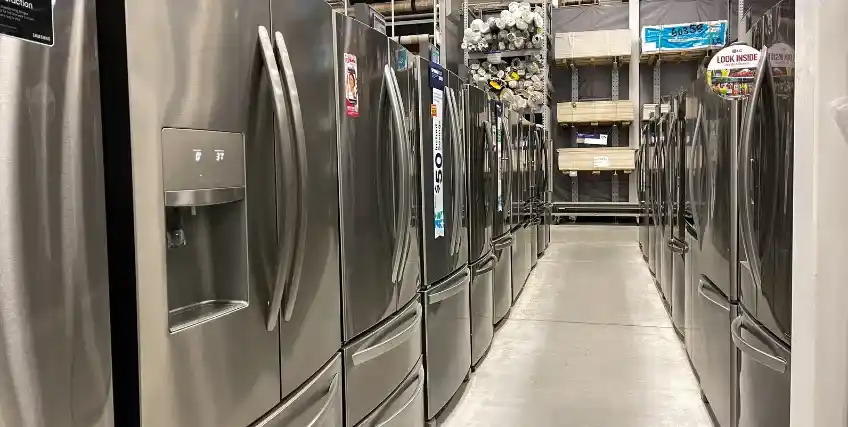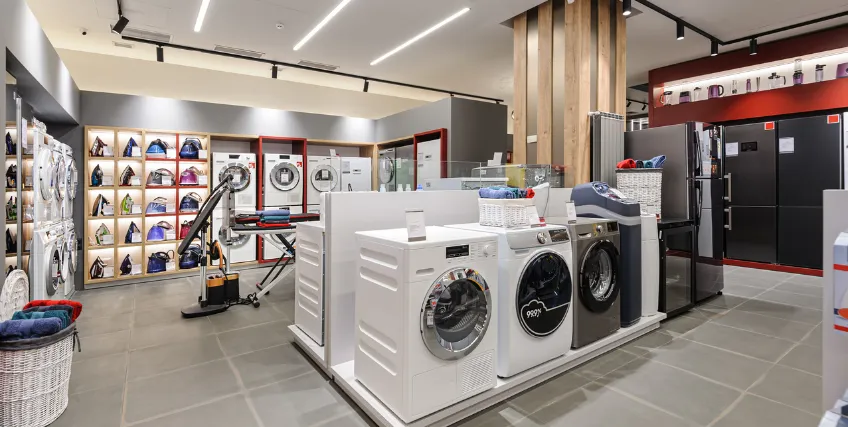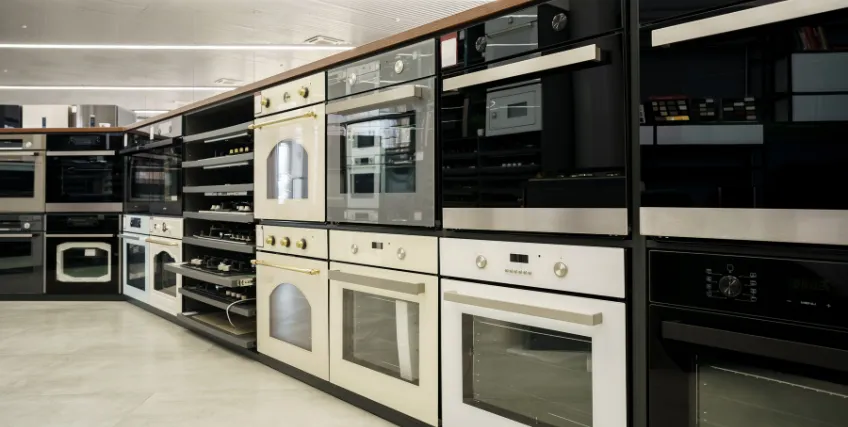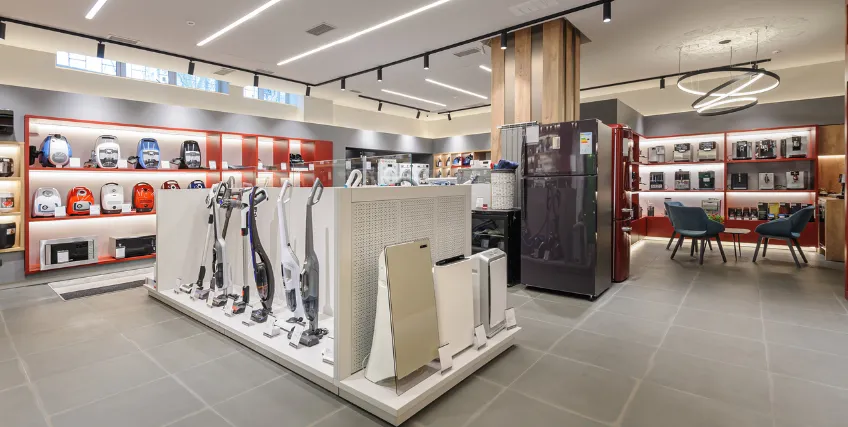Power Your Sales
with Flexible Appliance Store Funding
Looking for Business Financing?
Apply now for flexible business financing. Biz2Credit offers term loans, revenue-based financing, lines of credit, and commercial real estate loans to qualified businesses.
Set up a Biz2Credit account and apply for business financing
The appliance retail market in the US is vast and competitive. From small local retailers to nationwide chains, the demand for appliance store funding continues to rise. Why? Because the cost of stocking major appliances like refrigerators, washers, dryers, dishwashers, and kitchen appliances is steep, and consumers expect variety, quality, and competitive prices.
Appliance store business owners often face fluctuating cash flow. One month might bring in brisk appliance sales, the next may slow down. Seasonal demands, holiday promotions, and home improvement trends also affect payment options and inventory needs. Without adequate funding, stores risk missing out on bulk appliance purchases at wholesale rates or delaying store upgrades that could attract more customers.
In an era where shoppers compare offers in-store and online before checkout, staying competitive means having quick access to financing options. Whether that’s for stocking high-end brands, offering buy now, pay later plans, or expanding product lines to include washer/dryer combos or wall ovens, capital is essential.
The right appliance store funding ensures store retail business owners can manage upfront costs, offer flexible payment plans, and keep operations running smoothly. Even with a good credit profile, lenders may require proof of stable credit history, a clear business strategy, and an application process that meets their requirements. With the right plan, stores can navigate market shifts and seize opportunities quickly.
Understanding the Appliance Retail Landscape
The US appliance retail market is a mix of large national retailers and smaller independent appliance store operators. Both face unique challenges, but the need for reliable appliance store funding is the same. According to the U.S. Census Bureau, annual sales for home appliances consistently top billions of dollars, yet profit margins can be tight due to competitive prices, supply chain costs, and consumer demand shifts.
Appliance store business owners must keep inventory fresh. That means stocking new appliances like refrigerators, washing machines, dryers, and dishwashers year-round. Seasonal trends play a huge role. For example, kitchen appliances often see spikes during holiday seasons, while washer/dryer sales might climb during back-to-school months. Without access to adequate financing options, many stores struggle to prepare for these shifts.
Modern customers also expect more than just the right product at the right price. They look for payment options such as buy now, pay later, installments, or a payment plan with predictable monthly payments. Offering such choices often requires stores to have strong working capital options in place. Whether it’s through a line of credit, a personal loan, or specialized appliance financing, capital ensures stores can support these flexible offers.
Even bad credit can make appliance store funding a challenge, but it’s not impossible. Lenders may evaluate credit score, credit history, and financial situation before granting credit approval. Some may request a down payment or require proof of steady appliance sales.
The competitive nature of the industry means staying ahead with the best appliances, offering high-end brands, and ensuring a seamless checkout experience is non-negotiable. Strategic funding allows stores to meet these demands, maintain inventory, and attract more buyers in-store and online.
Why Appliance Store Funding Matters
Running an appliance store takes more than just selling washers, dryers, or refrigerators. It’s about having the resources to adapt fast, stay stocked, and meet customer expectations. The right appliance store funding makes that possible.
1. Inventory Stocking and Expansion
Appliance store funding ensures store retail business owners can keep shelves full of major appliances year-round. Whether it’s a surge in kitchen appliance sales before the holidays or stocking the latest washer/dryer models, quick access to funds helps you buy in bulk and negotiate better prices from retailers. This means more choices for customers, stronger appliance sales, and higher profit margins. Without funding, stores risk losing customers to competitors with better-stocked inventory.
2. Marketing and Promotions
Promoting appliance sales is costly but necessary. Seasonal campaigns, in-store events, and online ads can drive traffic, but they need upfront investment. With proper appliance store funding, you can launch targeted promotions, offer limited-time payment plan deals, and push buy now, pay later options without straining daily operations. That marketing boost can turn slow sales months into profitable ones and keep your store in the minds of buyers year-round.
3. Store Upgrades and Renovations
Shoppers expect clean, modern showrooms where they can browse new appliances easily. Funding helps with layout redesigns, lighting improvements, and tech upgrades like digital price tags or smart checkout systems. It’s not just cosmetic; better store environments influence purchase decisions, especially for high-end appliance purchases like wall ovens or premium refrigerators. Without the right capital, upgrading can be delayed, hurting sales potential.
4. Flexibility During Slow Seasons
Every appliance store business owner faces seasonal dips. With stable working capital options, you can handle monthly payments, cover payroll, and pay suppliers without stress. It also allows you to hold onto best buy opportunities when suppliers offer discounts. That flexibility keeps your business moving forward even when sales slow down, ensuring you don’t miss chances to improve stock or operations.
Types of Appliance Store Loans
There’s no single path to securing appliance store funding. Different types of appliance store loans suit different needs, depending on your store’s size, cash flow, and long-term goals. Here’s a breakdown of the most common ones.
1. Term Loans
A term loan provides a lump sum that you repay over a set schedule with interest. For appliance store business owners, it’s useful when upgrading showrooms, adding new product categories like kitchen appliances or high-end washer/dryer units, or financing major renovations. While repayment terms vary, having a predictable monthly payment structure helps with budgeting. Lenders often require a solid credit history and may ask for a down payment, but the stability of this option appeals to many store owners.
2. Business Lines of Credit
A line of credit works like a credit card for your business. You borrow only what you need and pay interest on the used amount. This appliance store funding option is ideal for managing seasonal cash flow or snagging bulk inventory deals on major appliances like refrigerators and dishwashers. It offers flexibility, especially for store retail business owners who need quick access to funds without a lengthy application process. Good credit score improves approval chances and may get you a lower interest rate.
3. Equipment Financing
Equipment financing helps cover the cost of appliance purchases for resale or store-use machines like delivery vans or installation tools. The equipment often serves as collateral, so credit check requirements can be more flexible. This is a common choice for those with bad credit who still need appliance store funding for stocking large appliances or adding new categories like wall ovens and washing machines. Repayment usually aligns with the equipment’s useful life.
4. SBA Loans
Small Business Administration loans are partially government-backed, reducing risk for lenders and making approval easier for qualified borrowers. SBA 7(a) loans, for example, can support store expansions, appliance financing, and home improvement tie-ins. While the application process is thorough and can take time, SBA loans often offer longer loan terms and competitive APRs, making them attractive to appliance store business owners with a solid financial situation.
Working Capital Options for Appliance Stores
Day-to-day operations can be unpredictable, which is why working capital options are so important for appliance store business owners. The right appliance store funding ensures you can handle routine expenses, grab supplier deals, and keep shelves stocked with major appliances like refrigerators, washing machines, and dishwashers.
One option is a business line of credit. It gives flexibility to borrow as needed and repay as sales come in. This works well during seasonal slowdowns or when you need to restock kitchen appliances quickly. Some owners also choose short-term loans for covering payroll, marketing, or appliance purchases before a big sale event.
Merchant cash advances are another route, offering quick funds in exchange for a portion of future appliance sales. While they often come with higher APR, they can be useful if traditional lenders hesitate due to bad credit or lower credit score.
In certain cases, appliance financing arrangements with suppliers can act as a built-in payment plan. This lets stores secure inventory now and make monthly payments later, improving cash flow without a large upfront cost. For stores offering buy now, pay later or installments to customers, having access to capital ensures those payment options won’t hurt operations.
The right working capital options depend on your financial situation, repayment ability, and seasonal needs. Choosing wisely can mean the difference between scrambling during slow months and staying ready for every appliance purchase opportunity.
Key Expenses Covered by Appliance Store Funding
Appliance store funding is more than just capital. It’s the fuel that keeps appliance store business owners moving forward. The right financing covers a variety of costs that directly impact sales, customer satisfaction, and store growth.
One major expense is inventory. Stocking major appliances like refrigerators, washers, dryers, dishwashers, and kitchen appliances takes significant investment. Whether you’re bringing in high-end models, adding wall ovens, or replacing older stock with new appliances, access to capital ensures you can buy at the best price and in bulk.
Renovations are another key area. A fresh showroom layout, upgraded lighting, or improved signage can help boost appliance sales and attract more in-store traffic. Many store retail business owners also invest in tech upgrades - from modern checkout systems to digital displays showing payment options and financing plans.
Marketing costs add up quickly. Seasonal promotions, buy now, pay later campaigns, and social media ads require upfront spending, but they can drive big returns. Appliance store funding gives you the flexibility to promote appliance purchases without straining your regular budget.
Operational expenses also qualify. Covering payroll, utilities, delivery vehicle maintenance, or even lump sum supplier payments keeps the business running smoothly. This includes supporting customer payment plans and managing monthly payments on store-owned assets.
By using appliance store funding strategically, owners can address both immediate needs and long-term improvements, setting the stage for consistent growth in an ever-changing market.
Smart Ways to Use Appliance Store Funding
Getting approved for appliance store funding is just the first step. How you use it can determine whether your appliance store thrives or struggles. The smartest appliance store business owners treat funding as a growth tool, not just a safety net.
One effective approach is investing in inventory expansion. Adding high-end kitchen appliances, the latest washer/dryer combos, or energy-efficient refrigerators can draw in more customers. Buyers often compare prices and brands across retailers, so offering a variety of major appliances keeps you competitive.
Marketing is another smart use. Launching appliance sales events, promoting buy now, pay later or installments, and highlighting payment plan options can drive foot traffic and online orders. A solid marketing push, funded through working capital options or a line of credit, can turn slow months into profitable ones.
Upgrading your store’s infrastructure also pays off. Renovating displays, improving lighting, or adding digital checkout stations can boost the customer experience. Even small enhancements can make appliance purchases more appealing, especially for best appliance models like wall ovens or large appliances.
Finally, having capital for operational stability matters. Covering payroll, managing monthly payments to suppliers, or making a lump sum down payment on bulk orders ensures the business runs smoothly. Smart allocation of appliance store funding can help you weather slow seasons, grab supplier discounts, and respond quickly to new market trends.
Common Challenges in Securing Appliance Store Loans
Getting appliance store funding isn’t always straightforward. Even established appliance store business owners can face hurdles when trying to secure financing. Here are some common challenges and why they matter.
1. Credit Score and Credit History
Many lenders place heavy weight on a store owner’s credit score and credit history. A low score or limited history can make appliance store funding more expensive, with higher APRs or stricter loan terms. For owners with bad credit, the process often involves providing additional collateral or making a larger down payment. Even then, approval isn’t guaranteed. Reviewing your credit report regularly can help you address issues before starting the application process.
2. Seasonal Revenue Fluctuations
Appliance sales can be seasonal, especially for kitchen appliances and washer/dryer sets. Some store retail business owners see strong sales in certain months and slow periods in others. Lenders may view inconsistent revenue as risky, affecting credit approval. Having documented payment plan performance, strong monthly payments history, and proven appliance purchase volume can offset these concerns.
3. Matching Loan Type to Need
Choosing the wrong option among the many types of appliance store loans can cause repayment strain. For example, using a short-term loan for large showroom renovations might lead to unmanageable monthly payments. Conversely, a long-term loan for quick inventory restocking could result in paying unnecessary interest. Understanding your financial situation and aligning it with the right funding option is key.
4. Collateral Requirements
Some appliance store funding options require collateral, whether that’s equipment, property, or existing inventory like large appliances and wall ovens. This can be a challenge for borrowers who prefer not to tie up assets. In these cases, unsecured loans or line of credit products may be better, though they typically come with higher APR. Balancing risk and reward is part of the decision.
Trusted by Thousands of Small Business Owners in America.**
Simply because we get what you go through to build a business you believe in.
**Disclaimer: All stories are real, as told by real business owners. Customers do not receive monetary compensation for telling their stories.
From One Entrepreneur to Another: We Get You
We understand what's behind building a business you believe in.
All stories are real, as told by real business owners. Customers do not receive monetary compensation for telling their stories.



Articles on Appliance Store Business Loans
Appliance Store Business Loans: Financing Options to Stock Inventory and Grow Your Retail Business
Running an appliance store can be both exciting and demanding. Customers count on you for essentials like refrigerators
Understanding Interest Rates and Terms in Appliance Financing Options
As a small business owner in the U.S., who owns an appliance store, you must be dealing with a lot of day-to-day challenges. Imagine, a customer walks...
How to Get a Small Business Loan for Your Appliance Store
Most small business owners have to navigate a constant struggle of balancing revenues and costs, but that can be particularly challenging for...
Tips to Get Financing for Your Appliance Store Without Straining Your Budget
Purchasing major appliances such as refrigerators, dishwashers, cooktops, wall ovens, and washers and dryers is fairly expensive, especially...
Frequently Asked Questions on Appliance Store Funding
1. What are the best working capital options for appliance stores?
The best working capital options depend on your needs and financial situation. Many appliance store business owners choose a line of credit for flexibility, while others prefer short-term loans for immediate expenses. Some also work directly with retailers or suppliers through appliance financing arrangements, allowing them to spread payments over time.
2. How can store retail business owners improve loan eligibility?
Improving credit score, maintaining clean credit history, and showing steady appliance sales help. Documented monthly payments, reliable payment plan performance, and a solid business plan can improve your chances of credit approval from lenders.
3. Are SBA loans good for appliance store business owners?
SBA loans often come with competitive loan terms, lower APR, and longer repayment schedules. They can be used for appliance purchases, renovations, or expanding into high-end product lines like wall ovens or premium refrigerators.
4. What types of appliance store loans have the lowest rates?
Generally, SBA loans and secured appliance store funding options offer lower rates, especially if you have good credit. Unsecured loans or financing for those with bad credit tend to have higher APR.
5. Can funding be used for both inventory and marketing?
Many appliance store business owners use funding for stocking major appliances like washers, dryers, and kitchen appliances, as well as promoting appliance sales through ads, buy now, pay later campaigns, and seasonal events.
Frequent searches leading to this page
Term Loans are made by Itria Ventures LLC or Cross River Bank, Member FDIC. This is not a deposit product. California residents: Itria Ventures LLC is licensed by the Department of Financial Protection and Innovation. Loans are made or arranged pursuant to California Financing Law License # 60DBO-35839




